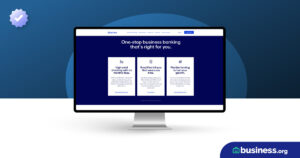💸 See if your business qualifies for a tax credit worth up to $26k per employee. 📞 Call Now: 855-979-9597
Types of Business Savings Accounts: Savings vs. Money Market vs. CDs
We are committed to sharing unbiased reviews. Some of the links on our site are from our partners who compensate us. Read our editorial guidelines and advertising disclosure.
Ready to start saving? Fantastic! But you’ve probably realized that there are several types of deposit accounts out there—and you might not be sure which to pick. What is the difference between money market and savings accounts, anyway? And how does a CD savings account (a certificate of deposit) work?
Well, the biggest differences between the three come down to flexibility and yield. Savings accounts generally have the lowest APY (annual percentage yield), but they’re cheap and easy to open and maintain. Money market accounts have a moderate APY, and they offer plenty of ways to access your money. And a certificate of deposit usually has the highest APY, but your money is locked up for a long term length.
All of which sounds great—but you probably still have questions. So below, we’ll explain the ins and outs of these three types of deposit accounts and help you decide which is right for your business.
Savings vs. money market vs. CDs
By signing up I agree to the Terms of Use.
Savings: Best for setting aside funds (and earning a little extra)
You may already know a lot about savings accounts from your personal savings, but here’s a refresher: savings accounts earn interest on your account balance, making them an easy way to earn money with your money.
Of course, there are some catches.
Many banks limit the number of transactions (including withdrawals) you can make from your savings account each month. Historically, this was because of a federal regulation that imposed a limit of six transactions per month on savings accounts. Now that regulation is gone, but some banks―not all―are holding to that limit.
So while you can always add more money to your account, your opportunities for withdrawing it may be a bit limited—unless you want to pay a fine and risk having your savings account converted to a checking account. (But again, this depends on your bank.)
Likewise, your methods for accessing your savings are limited. You can’t use checks with most savings accounts, although you can usually withdraw cash from an ATM.
And then there’s the matter of how much you earn. The APY on savings accounts is usually a bit less than the APY on money market accounts and much less than the APY on CDs. APY can vary from bank to bank, but it’s unusual to see a savings APY of even .01%, while an APY of less than 0.05% is relatively common. So if you really want to max out your earnings, a regular savings account might not be the best choice.
While savings accounts usually have a lower APY than money market accounts, online banks are changing that. Some of them offer surprisingly high APY on savings—better than the APY on money market accounts elsewhere. (For an explanation of APY, check out “What Is APY?”)
In fact, some people argue that the psychological benefit of a savings account—knowing that you can’t easily spend the money in it—is more important than the interest you earn.
But if you want a safe place to store your emergency fund and earn a little more while you do so, then a business savings account is a great option. You might even use it as a first stop as you save up for a business money market or CD.
Money market: Best for maximum access to your savings
Like a normal savings account, a money market account lets you earn interest on the money inside it. And just like a savings account, a money market account limits you to only six transactions per month. But a money market account does have a couple big advantages.
First, you can access the money in your account via both ATMs and checks. Sure, you may still be limited in how many transactions you can make (again, depending on your bank), but if you find yourself writing one or two payments from your business checkbook each month, a money market account might be just what you need.
Second, money market accounts have traditionally offered a higher APY than normal savings accounts (think in the neighborhood of 0.05% to 0.5%). That means you get easy access to your money, and you can earn more at the same time. Not a bad deal.
The downside to money market accounts? They tend to have a higher opening deposit and minimum account balance than savings accounts. If you can’t commit to keeping your account well-funded, then a money market account probably isn’t for you.
But if you’ve got the cash to save and you want the flexibility of a money market account, this account type might be perfect for your business savings.
CDs: Best for earning the most interest possible
CDs (certificates of deposit), on the other hand, offer almost no flexibility—but they offer the biggest payouts.
Unlike savings and money market accounts, CDs don’t let you touch your money at all until they “mature.” In other words, you agree to keep your money in a CD for a specified term length—and if you take it out early, you’ll have to pay a hefty early withdrawal penalty. (This means you can’t add money to your CD either; you’d have to get a new CD entirely.) While you can find terms as short as a few days, terms lasting a year plus are more common.
Why go with a long term then? Easy. The longer the term length on a CD, the higher the interest rate usually is. For example, we’ve seen business CDs that offer a 0.2% APY with a 7-day term, a 0.3% APY with an 11-month term, and a 1.41% APY on a 2-year term. And since CDs have a fixed interest rate, you know exactly what kind of return you’re signing up for before you commit.
Keep in mind that CDs often require a higher minimum balance than either savings or money market accounts (over $1,000 is common). That’s one more reason CDs are the least flexible—and the most profitable—savings account you can get for your business. Sure, the returns still won’t be as high as if you choose to invest your money, but the risks of a CD are much lower than the risks of investment.
If you want a safe, sure way to grow your business savings—and you can deal with the lack of flexibility—then a CD is just the thing for you.
How to choose the best account for your business
All three types of saving accounts have benefits and drawbacks. So how do you choose between a certificate of deposit vs. a savings account, or a savings account vs. a money market account? We suggest you think about a few questions:
- How much money can you put toward savings right now?
- Will you need to access your savings?
- What kind of yield do you expect to get on your savings?
Your answers to those questions should point you in the right direction.
How much money can you put toward savings right now?
As we pointed out above, most accounts have a minimum opening deposit, which is the least amount of money you can use to open a bank account. For savings accounts, this deposit can be as low as $25. The number is usually higher for money market accounts (think hundreds of dollars) and certificates of deposit (think one thousand or more).
Likewise, most financial institutions will waive any monthly fee on your account if you maintain a certain balance. If you have a savings account, that minimum balance could be just a few hundred dollars; for a money market account, it’s more likely to be thousands.
Will you need to access your savings?
If you need lots of access to your money, then you probably need a business checking account rather than any type of savings.
But if you can live with just six monthly transactions, then either a savings account or a money market account could work. Remember, though, that money market accounts usually let you use a debit card and write checks from your account; savings accounts don’t.
Certificates of deposit lock away your money during the term (no touching!), so they work best if you know you won’t need to access that money for a while—until it reaches maturity.
What kind of yield do you expect?
Savings accounts usually have a lower annual percentage yield (APY) than money market accounts, and money market accounts usually have lower interest rates than CDs. So if you want to maximize your interest earnings, a CD is probably your best bet.
(Of course, you can always look at current interest rates at your bank of choice to compare the current money market vs. CD rates.)
There is one caveat, though: CDs have fixed interest rates, while savings and money market accounts have variable rates. On the one hand, that means that a CD will protect you from plummeting interest rates that would hurt your earnings; on the other hand, that means that a CD could end up with a lower annual percentage than other accounts if market interest rates suddenly rise.
(For an explanation of how interest and APY work for savings accounts, check out our guide “What Is APY?”)
The takeaway
And there you have it: Now you know the difference between a CD and a savings account and between a savings account and a money market account.
All three are great options to store and grow your business savings. But depending on how much money you have, how much flexibility you need, and what kind of yield you’re hoping for, one of the three might work better for you than another.
But no matter what you choose, you’re making a great choice to save.
Now that you know what kind of savings account to open, be a responsible account holder and use the best business accounting software to keep your savings in order.
Related reading
Business savings account FAQ
Who has the best savings accounts?
We recommend an online savings account from Small Business Bank. It’s our favorite bank for business, and it offers both high-yield savings and money market accounts.
If you’re more interested in certificates of deposit, we recommend TD Bank. It offers a wide range of terms with respectable APYs.
Can I use personal savings/money markets/CDs for my business?
We don’t recommend it.
Many people want to know if they can use personal bank accounts for their business finances. For example, maybe you love using Vanguard for your personal savings goals—but Vanguard doesn’t offer accounts for small businesses.
But using a personal account for business reasons (even savings) can lead to messy tax situations and liability issues—not to mention the fact that your bank will probably get mad at you if it finds out. You can find more info in our guide “Do I Need a Business Bank Account?”
How safe are my savings?
Savings accounts, money market accounts, and CDs are all FDIC insured up to $250,000. Even if your bank fails (and we hope it doesn’t), you’ll get your money back up to that $250,000 limit.
Disclaimer
At Business.org, our research is meant to offer general product and service recommendations. We don't guarantee that our suggestions will work best for each individual or business, so consider your unique needs when choosing products and services.





